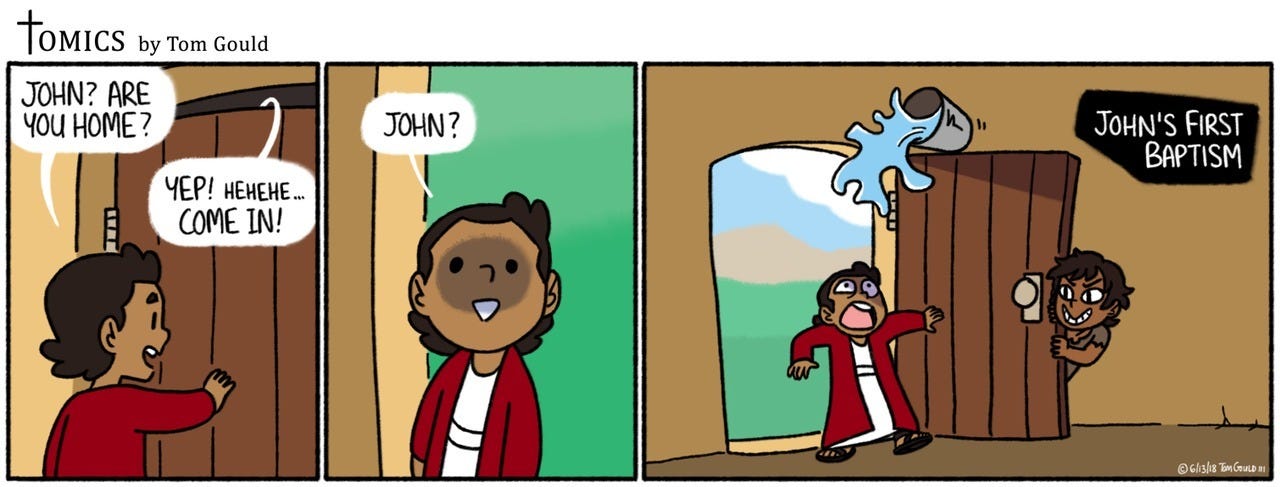Today’s first reading contains some, shall we say, spicy language. Without context, “O worm Jacob, O maggot Israel,” sounds pretty bad. Which is why Tim Barnett says we should never read a Bible verse. In other words, never read just one verse. We always need context.
(Sorry if you find the above thumbnail off-putting; that kind of language gets clicks. It’s a good video, I promise.)
Reading 1
Is 41:13-20
I am the LORD, your God, who grasp your right hand; It is I who say to you, "Fear not, I will help you." Fear not, O worm Jacob, O maggot Israel; I will help you, says the LORD; your redeemer is the Holy One of Israel. I will make of you a threshing sledge, sharp, new, and double-edged, To thresh the mountains and crush them, to make the hills like chaff. When you winnow them, the wind shall carry them off and the storm shall scatter them. But you shall rejoice in the LORD, and glory in the Holy One of Israel.
The afflicted and the needy seek water in vain, their tongues are parched with thirst. I, the LORD, will answer them; I, the God of Israel, will not forsake them. I will open up rivers on the bare heights, and fountains in the broad valleys; I will turn the desert into a marshland, and the dry ground into springs of water. I will plant in the desert the cedar, acacia, myrtle, and olive; I will set in the wasteland the cypress, together with the plane tree and the pine, That all may see and know, observe and understand, That the hand of the LORD has done this, the Holy One of Israel has created it.
Worms are gross. They’re slimy and slithery, and eat dead things. They’re also not dangerous. They eat, but their mouths have no teeth.
So, clearly it’s an insult to call the Israelites worms, right?
While it obviously highlights their helplessness, the metaphor also highlights the fact that the worms will win in the end. They conquer everything, with their soft mouths. Israel can call on God, with their mouths. He is the one who will make water spring from dry ground, and open rivers on bare heights.
Sometimes, it’s worth remembering just how much above us God is, as we are above worms.
Responsorial Psalm
Ps 145:1 and 9, 10-11, 12-13ab
R. The Lord is gracious and merciful; slow to anger, and of great kindness.
I will extol you, O my God and King,
and I will bless your name forever and ever.
The LORD is good to all
and compassionate toward all his works.
R. The Lord is gracious and merciful; slow to anger, and of great kindness.
Let all your works give you thanks, O LORD,
and let your faithful ones bless you.
Let them discourse of the glory of your Kingdom
and speak of your might.
R. The Lord is gracious and merciful; slow to anger, and of great kindness.
Let them make known to men your might
and the glorious splendor of your Kingdom.
Your Kingdom is a Kingdom for all ages,
and your dominion endures through all generations.
R. The Lord is gracious and merciful; slow to anger, and of great kindness.
God is our Lord and King, and thus deserving of our praise. Almost every psalm, even the psalms of lament, include some praise. This psalm invites everyone to join in praising God, and witnessing his splendor.
Alleluia
See Is 45:8
R. Alleluia, alleluia.
Let the clouds rain down the Just One,
and the earth bring forth a Savior.
R. Alleluia, alleluia.
This verse has been translated as rorate caeli in Latin, and sung during Advent since the earliest days of the Church. The first Christians were Jews, of course, and respected Isaiah as a prophet that foretold the coming of Jesus.
Which reminds me of a tweet a friend sent me—
Gospel
Mt 11:11-15
Jesus said to the crowds: "Amen, I say to you, among those born of women there has been none greater than John the Baptist; yet the least in the Kingdom of heaven is greater than he. From the days of John the Baptist until now, the Kingdom of heaven suffers violence, and the violent are taking it by force. All the prophets and the law prophesied up to the time of John. And if you are willing to accept it, he is Elijah, the one who is to come. Whoever has ears ought to hear."
All of the prophets, including Isaiah and Elijah, looked forward to the Messiah. John the Baptist is the last prophet. He’s in the New Testament rather than the Old, due to his proximity to Jesus Himself.
John is the end of one phase of history, and the beginning of the next. Literally, he was there when history changed from BC to AD. I’m sure his childhood growing up with Jesus was interesting.
But like the “worm” line in Isaiah above, calling John the “least” in the kingdom isn’t really an insult. Jesus regularly reminds us that we’re meant to serve, that the last shall be first and the first shall be last. John exemplifies that.





